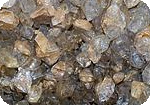| Tuesday, 13 May 2025 Home • About Us • Contact Us |
|
|
|
You are here:
Minerals are essential nutrients that your body needs in small amounts to work properly. We need them in the form they are found in food. That's why it's so important to make a point of including a variety of foods - which contain different minerals - in your diet every day.
Minerals can be found in varying amounts in a variety of foods such as meat, cereals (including cereal products such as bread), fish, milk and dairy foods, vegetables, fruit (especially dried fruit) and nuts. Minerals are necessary for three main reasons:
Some of these minerals are: calcium, phosphorus, potassium, sulfur, chlorine, sodium, magnesium, iron, manganese, silicon, copper and iodine. There are also trace minerals which are needed in lesser amounts, such as zinc, cobalt, molybdenum, chromium and selenium. The trace elements are also needed to ensure the efficient occurrence of certain metabolic functions If our foods do not contain enough of the right kinds of minerals we simply starve to death. It does not matter how much "good nourishing food," as this is commonly understood, that we consume, if these minerals are not present in sufficient quantities we suffer from slow starvation, with glandular imbalance or dysfunction, more disease and other evidences of decay. Life and health are so directly related to these minerals, that we can never have satisfactory health without an adequate supply of them. We may be sure that each mineral has its own separate function to serve, while certain combinations of them have long been known to serve vital services in the body. Minerals can be divided into three groups: the macrominerals (bulk elements), microminerals (trace elements) and ultra-trace elements (elements that are consumed in microgram quantities). Interestingly enough, minerals make out about 4-5% of your body weight. More or less 50% of this weight is calcium. There are a number of important things to bear in mind about minerals:
Link to this article: Show: HTML Link • Full Link • Short Link
Related Articles:
You must be registered and logged in to comment. |
|
 |
 | |
|
|








